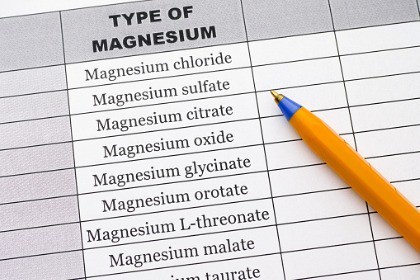Video Transcript:
Are you feeling stressed, fatigued, maybe slightly constipated, or notice after you work out, you still have sore muscles and, just, there’s tension, or even holding fluid in your body? Maybe you’ve experienced heart palpitations or an increase in your blood pressure.
I’m going to share with you an amazing solution that I recommend to all of my patients, regardless of their age or gender, and it is a full-spectrum magnesium. We call it Magnesium 7 here at Organixx, and magnesium is a powerhouse. It’s honestly one of the most essential macro-minerals that you need to be consuming on a daily basis.
One of the things that makes magnesium so critical for keeping you and your body and your health and wellness optimized is magnesium is involved in over 600 enzymatic reactions that help your body run efficiently and optimally. And one of the things that we know through scientific research is that magnesium is absolutely critical, optimizing those levels to keep your body healthy.
It not only functions as an electrolyte, which helps maintain your fluid balance, but it’s also the second most critical intracellular element, which means it is really, really important that you consume a magnesium on a daily basis, to help support your bone health, your heart health, and even your neurotransmitter health.
Magnesium for Stress Reduction & Sleep Support
So, let’s talk about if you are feeling stressed, or you notice maybe you’re not sleeping well, magnesium – simply adding magnesium into your body in a full-spectrum supplement like the Magnesium 7 – there are magnesium types that we offer you that can literally increase one of the most stress-relieving neurotransmitters called GABA. What we find is that the magnesium that you can get in Magnesium 7, the magnesium glycinate is the most efficient and most effective magnesium form to promote relaxation and a reduction in your stress levels.
Now, many people might experience an elevation in blood pressure or heart palpitations, or just notice they’re not sleeping well and even the digestive process slows down when we’re under stress.
Maybe you’ve taken cortisol tests and you know that your cortisol is elevated or you’ve got basement level cortisol because we have the stress response mechanism in your body that is imbalanced. That affects all aspects of your body. And where magnesium and its involvement in over 600 enzymatic reactions in your body, magnesium helps to support muscle and nerve function, which is so optimal.
Breaking Through the Blood-Brain Barrier
There are actually three forms of magnesium that can break through the blood-brain barrier and you’re going to find those here in our Magnesium 7. So, that’s really important when we’re looking at, how do we keep you youthful? How do we keep your body and cells optimal, and optimizing, and efficient? How can we support the stress response mechanism and lower your body’s reactivity to stress?
And also, how do we help optimize your body’s transport of essential minerals, thereby increasing your energy production?
Magnesium can do all of that and more.
Magnesium is an Essential Macro-Mineral
Magnesium is an essential mineral, macro-mineral, that can help make protein. So, your body can actually make critical proteolytic, or what we would consider metabolic enzymes, that support bone density – enhancing the remineralization of your bones – as well as enhances your DNA from any oxidative stress.
So, if you are looking to protect your cells, protect your DNA, and to also support your heart health, improve your digestive process and balance your stress response mechanism, magnesium is one of the best minerals, in a full-spectrum form, meaning multiple forms.
When to Take a Full-Spectrum Magnesium Supplement
We have seven different types of magnesium in Magnesium 7. That’s going to be really critical for addressing assorted deficiencies, like the symptoms of imbalanced sleep, constipation, anxiety, and even depression, bone loss. Those are all going to be signs of some magnesium deficiencies.
So, powering up your body on a daily basis with magnesium, you’re going to notice a difference. And in fact, my patients, when I recommend they take a magnesium in the morning and in the evening – so, a dose of Magnesium 7 would be, we have on the supplement facts, two capsules. Take two capsules in the morning. Two capsules in the evening. So, you’ve got kind of a sandwich. Start of the day and end the day with magnesium. You’re going to get a steady stream of enzymatic support to help enhance your muscle and nerve function, as well as lower your stress response mechanism. You’re going to notice it within 24 hours.
I’m so excited to share the amazing capacity, the healing capacity that magnesium can deliver to you. So, I hope you will put a Magnesium 7 in your cart today, and I can’t wait to hear all the great results that you experience in adding this absolutely critical powerhouse of a supplement into your daily life.
Magnesium deficiency is linked to stress, diabetes, heart disease, osteoporosis, chronic fatigue syndrome, depression, anxiety, trouble sleeping, sore muscles, migraines, and many more debilitating health conditions.
If your body needs magnesium, you want the most beneficial kind your body can actually absorb. Organixx Magnesium 7 gives you seven (7) of the very best, most bioavailable types of elemental magnesium available.

Video Transcript:
Today, I want to talk about one of the leading sources of men’s health angst, which is prostate imbalances, prostate inflammation, BPH, elevations in prostate testing, like PSAs, and even, potentially, biopsies that might have yielded a positive cancer diagnosis.
So overall, I want to share with you some ways to address prostate health, and specifically, I want to share with you, I actually have a guide that I have written for gentlemen, that is something you can grab, click on a link down below, which is my prostate fix guide. I also have a masterclass that’s available for all gentlemen to take to learn. It’s a deep-dive, a 60-minute deep-dive into understanding how to address prostate imbalances. So, let’s dig into some things that we need to address.
Prostate Anatomy
With any type of elevation in PSA marker, or a challenge with urine flow, or notice the frequency is there, or any type of irritation at the very end of urination, we’re dealing with an inflamed prostate gland. Now, what does that mean?
An inflamed prostate gland, essentially, is a combination of an accumulation of fluid, so we actually have kind of a swelling, if you will, in the gland and around the gland. In the middle of the gland is the urethra, the ureter. So, it’s like a donut, and in the middle is the process where we’re able to urinate. When that gland gets swollen, it swells on the outside, and it swells on the inside. So, that’s where we can get challenges with urine flow and imbalances throughout the day.
Is Excess Estrogen Causing Inflammation?
Now, the other thing that we’re dealing with in the prostate gland is that the prostate is highly receptive to excess estrogen. I talk more about this in my guide, and I’m digging further into it in my masterclass. But estrogen, for men, can be the leading source of inflammation. So, if we want to deal with estrogen accumulation in the male body, we need to do a few things. We need to lower overall inflammation in the body, and we do this through two ways. One, I love to supplement with Joint & Muscle Care (formerly Magi-Complexx capsules) for gentlemen. This is a very inflammation-reducing supplement. It’s a trio of herbals that are known to reduce inflammation in the body. They also help create the lymphatic process and the lymph flow that will clear a lot of inflammation in and around the prostate gland.
So turmeric, frankincense, and myrrh, these are very grounding. They’re very good for that lower pelvic region. This can help reduce some of the inflammation of that gland. So for gentlemen that may experience… what I see in a lot of my patients is a greater urination process at night. So generally, a gentleman will kind of get to bed, and then they go through two or three wake-ups where they have to urinate. But they’re not urinating fully, so they’re not emptying their bladder fully. Part of that is inflammatory. It’s also related to a particular stress hormone. That is something we’re going to address, too, but the Joint & Muscle Care (formerly Magi-Complexx) is something you could take at night. And so you could take it around dinner time. That’ll start to lower the inflammation levels and start to minimize that nighttime waking.
Support the Liver
Now, the second thing that we need to do is we need to address the liver. The liver is a key detox organ, and the liver is also important for estrogen metabolism. So supporting the liver by drinking dandelion tea or adding milk thistle liquid herbal drops to that dandelion tea mix is a very powerful way at detoxing the liver and supporting the estrogen metabolism, meaning the breakup of estrogens that’s going to eliminate through the bowel contents and move out through the colon and rectum. That’s really important. And so targeting the liver is a really important part of this whole inflammatory reduction process when it comes to prostate health.
Is Stress a Factor?
The third thing that we want to do is address stress. Stress management. And let’s talk about stress. It’s not so much like, “Oh. I’m thinking I’m stressed,” or … For a lot of my gentlemen, they’re retired, so they’re like, “I don’t have the work stress, but I have this physiological stressor.” We have an assortment of stressors. We can have chemical stressors. We can have environmental, like allergy, allergens, internal to the body, like food allergens, or external. We could be dealing with micro-toxins, mold exposure. We could be dealing with an overwhelm of heavy metal exposure from work environment or maybe lifestyle, like smokers or folks that were consuming tobacco.
We can also deal with the stressor hormone, which is called cortisol. Cortisol is a very inflammatory-related hormone that can cause a whole bunch of stress inside the body, and it ultimately leads to some of the inflammatory challenges the prostate gland experiences. So, stress management techniques, like meditation and yoga, are some of the most powerful, free, stress-reducing tools that you can use on a daily basis. For gentlemen, sometimes, also reducing stress might be exercising in a different way, so doing more of a cardiovascular-based exercise in a 30-minute window.
So, instead of working out for an hour or doing hardcore weights, the most impactful exercise would be 30 minutes. Maybe it’s getting on a rowing machine and doing rowing or swimming. Those are very powerful, full-body exercises that support cardiovascular health but minimize the cortisol production. So a lot of men who are working out and kind of really doing a lot of weight lifting and high impact, the HIIT exercises or CrossFit, sometimes, they’re triggering cortisol in a way that is negative to the prostate gland.
Mineral Deficiency Is Easily Fixed
Now, another thing that I like to address is adding a very powerful mineral that is often going to be in a deficient state in our body. And particularly in the male body, this mineral deficiency can lead to inflammatory conditions, not just in the prostate, but joints. You might notice gout or swelling in the feet and ankles, and you might also notice kind of holding fluid here in the midsection.
Magnesium is a really critical mineral for lowering the inflammatory levels in our body, and we have Magnesium 7. I love to recommend adding this powder, so you can break open the capsules. You can add this into a smoothie. You can add it into your tea or morning coffee. It’s really great to add in twice a day – in the morning and in the evening. That can be a powerful way to support your prostate gland.
So, these are some tips. If you’re interested in going even deeper into healing the prostate gland, addressing inflammation and these inflammatory markers, like an elevation in PSA levels, where maybe you’ve been diagnosed with prostate cancer that’s being monitored or are dealing with, maybe, a catheter on a daily basis, I’m going to invite you into taking my Prostate Fix masterclass. We’ll walk away, after 60 minutes of this impactful class, you’ll walk away with some immediate resources, tactics, tips, and even a companion guide to impact your prostate gland in a positive way.
Joint & Muscle Care is a revolutionary supplement that takes three of the strongest inflammation support agents in nature (frankincense, myrrh, and turmeric), and combines them in the same perfect union treasured by the ancients. Available in capsule form or as an essential oil blend called Magi-Complexx.

Do you worry about things constantly? Does persistent stress keep you from relaxing, even at the end of your workday? Do you have trouble falling or staying asleep? If so, then you could be suffering from anxiety that, if left to run its course, could end up snowballing into a lifetime of chronic illness.
Roughly 40 million Americans suffer from anxiety disorders that, in many cases, started off as routine bouts of stress and anxiety that were shrugged off as being part of life. Consequently, it piled on to the point of inducing panic attacks, obsessive-compulsive disorder (OCD), and even post-traumatic stress disorder (PTSD) [1].
The medical establishment offers pharmaceutical medications and psychotherapy as solutions, but what if the root cause of many cases of depression and anxiety is a mineral deficiency? What if something as simple as consuming more magnesium helped to take the edge off and gave you some daily peace of mind? In this article, we’re exploring some of the research into and the benefits of magnesium for depression and anxiety.
As Magnesium Deficiency Has Increased, So Has Chronic Illness
An increasing volume of research is pointing to magnesium deficiency as the culprit behind a wide range of health problems. The majority of people living in America and Europe are now deficient in magnesium, and the statistics on rising levels of chronic illness all throughout the West reflect that.
More than 600 critical chemical reactions throughout the body require magnesium [2], including:

- energy creation
- protein formation
- gene maintenance
- muscle movements
- nervous system regulation
And yet most people don’t get nearly enough magnesium from diet alone. Depending on what you eat and how active you are, you could be slightly in the red or deeply deficient in this life-supporting mineral.
Even people who think they’re healthy may not be getting enough magnesium due to chemical exposure, depleted growing soils, and heavy food processing.
Decreasing Magnesium Levels in Food
Refined wheat, for example, only contains about 16% of the original amount of magnesium compared to whole wheat [3]. Many other foods are just as bad or worse, including foods that would otherwise be healthy were it not for various environmental factors that deplete their mineral stores.
Consequently, average magnesium consumption dropped from about 450 milligrams per day in the 19th century and prior to 250 mg or less per day in the 20th and early 21st centuries.
Athletes Need More Magnesium

If you exercise regularly, you could be even more deficient as athletes require an additional 10-20% more magnesium just to keep up with the baseline levels of everybody else.
Only you know your own body, but if you constantly feel sluggish, worried, stressed, or depressed – especially for no obvious reason – this could be your body telling you that you need more magnesium for anxiety to calm your nervous system, feed your brain, and promote overall feelings of balance, calm, and wellbeing.
Mood Disorders Were Rare in the Early 1900s
Consider the fact that people born around 1900 rarely experienced depression, either in childhood or adulthood. The depression rate was barely one percent.
In 1935, however, it jumped to one percent by the time a person reached 15 years old, and two percent by the time they reached 25. By the age of 45, a comparatively whopping nine percent of those born in 1935 were determined to suffer from depression.

Depression Rates Jumped to 25% by 1955
These figures all respectively increased for those born in 1955, with six percent of people in this demographic developing depression by the age of 25, and 25% of people born in 1955 developing it at some point throughout the course of their lives.
Depression Today Is a Global Issue
Today, nearly half of all people will develop a depressive disorder, a massive increase that directly corresponds to ever-increasing rates of magnesium deficiency, which is rapidly becoming a global problem.
“Approximately 68% of U.S. adults consume less than the U.S. recommended daily allowance (RDA) of Mg (420 mg / day for men, 320 mg / day for women), with 19% consuming less than half of the RDA,” warned one research study looking into magnesium for depression and anxiety in adults back in 2009 [4].
Signs & Symptoms of Depression
Depression isn’t just feeling sad all the time. The core symptoms of depression include:
- lack of energy
- increased or decreased appetite
- weight and sleep disturbances (difficulty falling asleep or staying asleep, early morning awakening, and melancholic depression)

On the emotional side, symptoms may include:
- easy agitation
- sadness
- unresponsiveness (feelings of “feelinglessness”)
- erratic behavior
- unfounded guilt
- suicidal thoughts
Since the human brain is fueled by magnesium, it makes sense that a lack of it could lead to mood swings, “brain fog,” and over time much more severe health problems if the deficiency persists [5,6].
Science has pegged the lack of magnesium as one of the major contributors to widespread mental illness and other health problems [7].
Depression & Anxiety Are Neuropsychiatric Disorders
Neuropsychiatric disorders (which include depression and anxiety) now account for 36% of all non-communicable illnesses. They are also the leading cause of all disabilities – more than twice that of cardiovascular diseases and cancer – in both the U.S. and Canada.
If you’re not familiar with the terminology, neuropsychiatric disorder is an umbrella term for a wide range of conditions that affect neurology (the nervous system) and psychology. This includes:

- certain types of addiction
- eating disorders
- palsies
- seizures
- migraine headaches
- unfiltered anger
- attention deficits
- cognitive deficits
- anxiety and depression
In addition to anxiety and depression, correcting a magnesium deficiency has shown to be helpful with other neuropsychiatric disorders including migraine headaches [8] and ADHD [9].
Most Cases of Major Depression Are Resistant to Drug-Based Treatments
The unfortunate reality of treating mental disorders (including anxiety and depression), is that drugs often don’t work and can actually make things worse in some cases. Studies have found that most cases of major depression (MD) are actually resistant to drug-based treatments anyway, a pathology that’s officially known as treatment-resistant depression [10].

Some antidepressant drugs have been shown to provide minimal benefits, but this may be simply because they work to increase magnesium levels in the brain. In other words, magnesium is the active ingredient in the remedy, while said drugs merely act as delivery vehicles to get that magnesium to where it needs to be.
Since there is no pharmaceutical in existence that is free from side effects, it may be worth exploring with your doctor if magnesium supplementation is beneficial for addressing your anxiety or depression.
Magnesium Deficiency Linked to Other Brain & Nervous System Issues
As it turns out, many of the risk factors for depression directly overlap with symptoms of magnesium deficiency. These include things like:
- low systolic blood pressure
- reduced heart rate variability (HVR)
- insomnia
- elevated inflammatory markers like plasma interleukin g (IL-6), TNFα, and prostaglandin E2 (PDE2)
Magnesium deficiency that leads to psychological pathologies can also trigger pathophysiologic mechanisms such as:
- increased stress hormone axis (HPA-axis)
- higher density of rapid eye movements during sleep
- less slow-wave sleep (SWS), particularly during the first sleep cycle
Magnesium deficiency also causes calcium channels coupled with N-methyl-D-aspartate (NMDA) to bias towards opening, which in turn causes neuronal injury and neurological dysfunction. This explains why anti-inflammatory substances like TNFα-antagonists, cyclooxygenase inhibition, and omega-3 fatty acids have been shown in studies to also produce antidepressant effects.

All that to say if magnesium is lacking, the brain and nervous system can end up going haywire. The good news is that introducing more magnesium through diet and/or supplementation has been shown to produce the opposite effect.
Studies Show Magnesium Can Reduce Feelings of Stress & Improve Mood
One of the first studies on magnesium treatment ever published for agitated depression back in 1921 found that 88% of those who received it had successful outcomes. More recently, a randomized controlled trial found that older adults with type 2 diabetes who took 450mg of magnesium daily improved their mood to the same degree or better than if they took an antidepressant pharmaceutical [11].
Another study that looked at athletes who took magnesium for four weeks found that they experienced dramatic improvements in their ability to run, cycle, and swim during a triathlon. More importantly in terms of brain health, these athletes saw notable decreases in levels of insulin and the stress hormone cortisol, resulting in decreased stress and anxiety [12].
What Is the Best Magnesium for Anxiety and Depression?

While more people (including those with anxiety and depression) are becoming aware of the magnesium deficiency epidemic, many of them are confused about how to correct it – especially when there are so many choices out there for magnesium supplements.
As you might expect, not all magnesium supplements are created equal. Many use cheap forms of magnesium that are lacking in bioavailability, while others fail to cover the full spectrum of what magnesium in its different forms has to offer.
Organic vs Inorganic Magnesium
There are two major types of elemental magnesium salts available: organic and inorganic.
Inorganic salts of magnesium include:
- magnesium oxide (the main ingredient in milk of magnesia)
- magnesium chloride
- magnesium hydroxide
- magnesium sulfate (Epsom salt)
Inorganic magnesium salts contain higher concentrations of magnesium, but they are much more difficult for the body to absorb. For example, the body is only able to absorb around 4% of magnesium oxide taken by mouth [13].

Magnesium oxide is also more likely to cause diarrhea. Because less of it is absorbed into the body, it leaves more magnesium in the intestine to act as a laxative. This laxative effect is beneficial if you’re constipated, but likely not desirable the rest of the time!
Organic salts have much higher bioavailability. When looking for a quality magnesium supplement, here are some of the best types available.
7 of the Best Types of Magnesium for Bioavailability (Absorption)
1. Magnesium Citrate
Bound with citric acid, this type of magnesium is found naturally in citrus fruits. It’s what gives them their tart, sour flavor. Magnesium citrate is relatively easy to find and highly bioavailable [14].
Taking magnesium citrate for anxiety is a popular natural remedy. It’s also used by people who suffer from constipation as it produces a laxative effect. Magnesium citrate also works as a calming agent to support a healthy mood and relaxation [15].
2. Magnesium Glycinate
Formed by combining elemental magnesium with the amino acid glycine, magnesium glycinate is found in many protein-rich foods such as meat, dairy, fish, and legumes. Like magnesium citrate, it’s easily absorbed and produces a calming effect.
It is commonly sold as a standalone supplement to support healthy inflammation levels and promote rest [16].
3. Magnesium Aspartate
A common ingredient in the muscle-building formula ZMA (zinc magnesium aspartate), magnesium aspartate may be useful for energy generation, muscle creation, and nerve function.

When combined with zinc and vitamin B6, evidence suggests that magnesium aspartate could aid in hormone balance, exercise recovery, healthy sleep, muscle support, and increased strength.
Made by chelating aspartate, magnesium aspartate is also beneficial for supporting a healthy acid-alkaline balance in the body. It has also been shown to reduce insulin resistance in overweight people with otherwise normal levels of serum and intracellular magnesium [17].
4. Magnesium Malate
When combined with malic acid, magnesium becomes magnesium malate, one of the most highly bioavailable forms of magnesium available [18]. Many people use magnesium malate for depression, migraines, and chronic pain. It also functions as a laxative to promote regular, healthy bowel movements, as well as an antacid for heartburn and an upset stomach [19].
5. Magnesium Orotate
The orotate component of magnesium orotate is a critical component in the construction of bodily genetic material such as DNA [20]. Unlike many of the other forms of magnesium out there, orotate does not produce a strong laxative effect, though it is highly bioavailable.
Its orotic acid component plays a unique role in supporting the energy production pathways found in heart and blood vessel tissue, making it popular among competitive athletes and fitness enthusiasts. Magnesium orotate may also help people with heart disease.

One study that looked at people with congestive heart failure who took magnesium orotate supplements found that it helped to improve symptom management and survival outcomes better than a placebo. The only downside is that magnesium orotate is generally more expensive than other forms of magnesium.
6. Magnesium Taurate
Made with the amino acid taurine, magnesium taurate is perhaps most known for the role it plays in regulating blood sugar, as well as blood pressure, making it a powerful heart health nutrient.
7. Magnesium Amino Acid Chelate
Derived from the Greek word for “claw,” chelate refers to the combining of organic compounds with inorganic compounds for the purpose of improving bodily uptake of a nutrient. The belief is that chelates bypass the normal digestive process, meaning minerals (in this case magnesium) are deposited directly into the body without having to be processed through the gut.
As you might guess by its name, magnesium amino acid chelate is magnesium bound to amino acids – the building blocks of protein. Another common term for magnesium amino acid chelate is simply “magnesium chelate.”
Some believe magnesium chelate to be the “purest” form of magnesium because its complete ring structure reduces the chance that it will negatively react with fat-soluble vitamins and other minerals in the digestive tract, boosting not only its absorption rate but also its effectiveness.
Recent Research Confirms the Benefit of Magnesium for Depression and Anxiety
Does magnesium help with depression and anxiety? From the available evidence, it appears that magnesium supplementation is well-tolerated and enhances the efficacy of conventional antidepressant treatments.
According to a 2016 review published in the journal Magnesium Research looking into magnesium and depression:
“The mood-improving potential of magnesium compounds have been confirmed by the results of numerous pre-clinical and clinical studies [21].”
A 2017 systematic review examining the effect of magnesium supplementation on subjective anxiety and stress concluded that:
“Existing evidence is suggestive of a beneficial effect of Mg on subjective anxiety in anxiety vulnerable samples [22].”
An even more recent systematic review of the role of magnesium in mental disorders was published in June 2020 in the journal Nutrients. These researchers concluded that “from the available evidence, it emerged that supplementation with magnesium could be beneficial [23].” They also recommended more studies to evaluate the efficacy of magnesium alone and in combination with other drugs (e.g., antidepressants) in order to establish correct use.
Introducing Organixx Magnesium 7
If you and your doctor have determined that magnesium supplementation is appropriate for you, you might consider a highly bioavailable source of magnesium such as new Magnesium 7 from Organixx.
Magnesium 7 is a premium, broad-spectrum magnesium supplement that includes equal amounts of seven of the best organic types of magnesium. In each 2-capsule serving of Magnesium 7, you get 500 mg of the highest-quality elemental magnesium in “chelated” (bonded) forms for optimal bioavailability.
Magnesium deficiency is linked to stress, diabetes, heart disease, osteoporosis, chronic fatigue syndrome, depression, anxiety, trouble sleeping, sore muscles, migraines, and many more debilitating health conditions.
If your body needs magnesium, you want the most beneficial kind your body can actually absorb. Organixx Magnesium 7 gives you seven (7) of the very best, most bioavailable types of elemental magnesium available.





